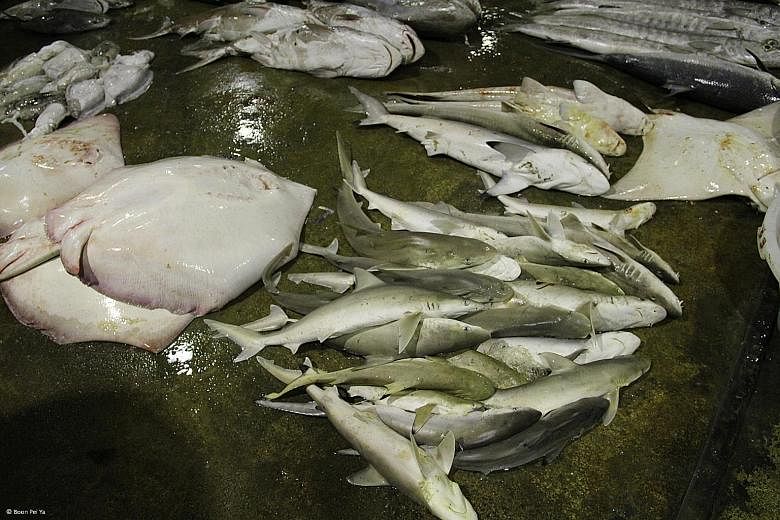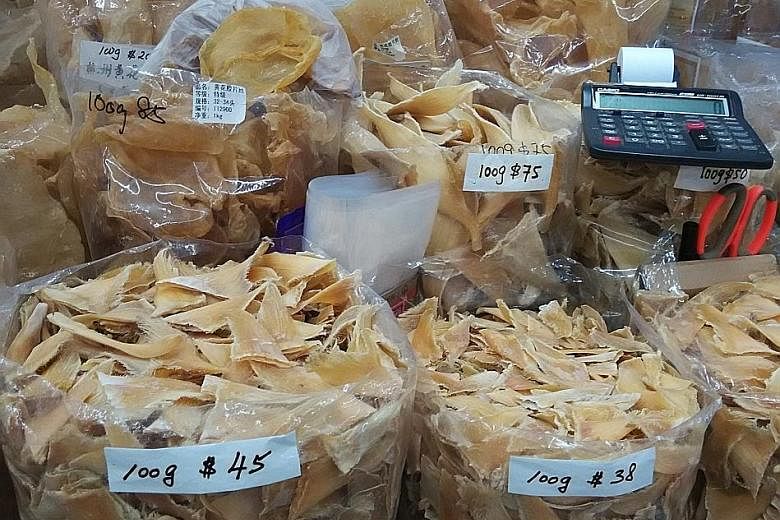More people and hotels here may be saying no to eating or serving shark's fin soup, but a new report has found that Singapore is still a top trader of the controversial delicacy. In fact, the city state emerged as the third-biggest importer and exporter of shark fins out of the 68 countries and territories studied.
The report, released yesterday by global wildlife trade-monitoring network Traffic and nature group World Wide Fund for Nature (WWF), looked at figures from the Food and Agriculture Organisation between 2005 and 2013.
It showed the Republic imported 14,134 tonnes of shark fins, which makes it the third-biggest importer after Hong Kong (83,210 tonnes) and Malaysia (33,894 tonnes).
Over the same period, Singapore exported 11,535 tonnes of shark fins. Again, it is ranked third, after Thailand (47,208 tonnes) and Hong Kong (41,877 tonnes).
The report is the first detailed one on the shark and ray trade here, although other surveys were done to monitor consumer sentiment.
For example, a study by WWF-Singapore last year found that 82 per cent of Singaporeans surveyed had not consumed shark fin for at least a year.
WWF-Singapore chief executive Elaine Tan said: "The fact that Singapore is a significant trader means the solution to the global shark crisis lies on our shores."
Both Traffic and WWF are now calling on the local authorities to employ more robust monitoring of trade volumes and protect the species, saying Singapore's role cannot be overlooked.
Trading hubs like Singapore are as critical as source and demand countries in finding a global solution to addressing illegal wildlife trade, said WWF- Singapore.
There are 30 shark and ray species threatened with extinction listed on Appendix I and II of the Convention on International Trade in Endangered Species of Wild Fauna and Flora (Cites), which means permits are needed for the trade in them. However, the study noted that Singapore did not have species-specific product codes for all 30, which means that trade in the other species may be illegal and unsustainable, but goes unnoticed.
Dr Chua Tze Hoong, group director of AVA's quarantine and inspection group, said it updates the list of species-specific product codes whenever new shark or ray species are listed under Cites, citing examples of 10 shark and ray species with species-specific product codes, including manta rays, oceanic white-tip and great hammerhead sharks. However, it is unclear if this list is exhaustive.
Ms Kanitha Krishnasamy, a senior programme manager for Traffic in South-east Asia, said: "Key to any effort aimed at enabling legal and sustainable sourcing, and long-term viability of shark populations, is the open availability of product-specific trade data."
AVA's Dr Chua said the agency investigates credible feedback, collaborates with other enforcement agencies, and routinely monitors imports, retail outlets and online sources.
Enforcement action will be taken against those who engage in illegal wildlife trade, said Dr Chua, adding that there is currently no call by Cites to suspend any international trade in sharks or their parts.



